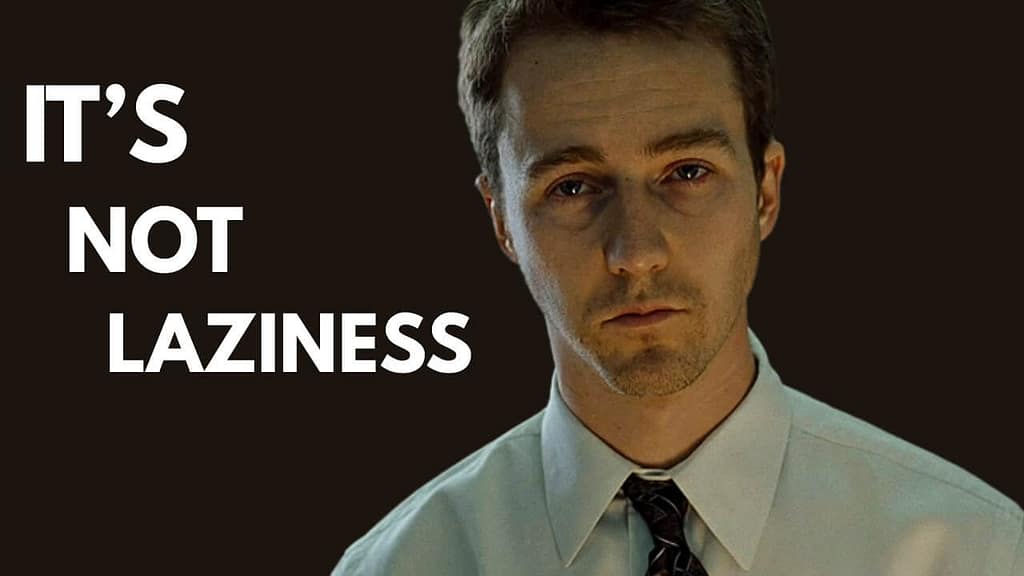You know, I had a master’s degree in procrastination.
It was one of the things, actually, the only thing I was great at.
Then one day, as I was cleaning the folders on my computer, I found this book, “Overcoming Procrastination” by Dr. Albert Ellis, and I kid you not—I’ve had it since 2021.
It didn’t end up there by mistake; I just, you know, kept delaying until I totally forgot about it.
When I finally decided to read it, I could see the full picture… a lot of things I had learned in therapy and from other books started to fall into place like pieces of a puzzle.
Now, Dr Ellis explained that you don’t procrastinate because you’re lazy, but because you’ve adopted a self-defeating philosophy. So by changing it, you can develop focus and discipline fairly quickly.
Why Procrastination Isn’t Laziness
Do you know what’s the toughest part about procrastination?
It’s not the fact that you’re moving away from your goals.
It’s the self-inflicted mental torture.
Every time I avoided work or studying, I’d tell myself: “When I get back to it, I’ll work two times… No, three times harder.”
And almost every time, I ended up doing the bare minimum.
I’d worry myself sick about failing, and I’d also tell myself that I’m a worthless person.
You’d think all that stress, all that guilt, would finally push me to change.
But it never did.
Instead, it dragged me into a vicious loop:
I procrastinate, I get poor results, I feel like a victim [Poor me, I failed]
Then I blame others for my situation.
I get worse results because I’m not reading the situation clearly.
The Self-beating continues – and here it gets more interesting… I’ve formed a belief that since I’ve failed many times before, I’ll probably fail again, so why bother doing my best?
Then I fail and I’m like, “How did this happen?”

This leads to more procrastination, and the cycle continues.
Now, going through this process can feel so natural, right?
You can talk yourself into going into each of these steps in such a seamless manner that you’ll spend years setting ambitious goals and always falling short. To make matters worse, if you go through that process long enough, you’ll probably develop anxiety and depression.
So by building discipline, you’re not simply working towards your goals, you’re also protecting your mental health in the long run.
Let’s talk about the three major causes of this loop and how to beat them.
We’ll start with the most powerful one:
#1: Self-Downing – When You Tie Your Worth to Performance
We all want to do a great job. We also want love and approval, especially from the people we care about.
But things start to fall apart when we take those wants, those desires, and turn them into absolute necessities.
It sounds like this:
- I must crush every important task… essays, chores, sports, dating, dancing… or else I’m a failure.
- I must get their love and approval; otherwise, I’m a worthless person.
Basically, your sense of worth depends on how well you perform and whether certain people like you.
No wonder your emotions swing up and down like a stock chart.
But here’s where it gets more interesting…
- If you don’t try, you can’t fail.
- If you don’t risk anything, you can’t lose anything.
So instead of facing the pain of failure head-on, we avoid it altogether.
For example, let’s say I have to write an essay and I procrastinate doing it till the last minute. In this case, I’ll probably get a bad grade, right? However, I got a bad grade not because I don’t know how to write, but because I didn’t put much work into it.
Or let’s take another example: There’s someone I really like and want to ask out on a date. I keep saying I’ll do it, but I never do. There’s always some excuse. Because deep down, if I ask and get rejected, I’ll feel worthless. But if I never ask? I didn’t really fail.
So it’s much easier for us to accept being a procrastinator than to risk trying something and failing, and proving to ourselves that we are not good enough.
Now, how can you stop this habit of self-downing?
First, accept that this “sacrifice” that you’ve made consciously or unconsciously… has been for nothing. It has brought you only misery and failure. Accept that it happened and move on.
But don’t turn that realization into more self-hate. You just did what you could with the mindset and tools you had, but now you know better and you can do better.
Second, make the distinction between rating a behavior and rating yourself.
Messing up a task doesn’t make you a failure. It just means you made a mistake. So fix it. Learn from it. Move on. And pay attention to how you’re talking to yourself: Are you criticizing? Are you shaming yourself? We want to be careful that we have a constructive internal dialogue.
#2: Low Frustration Tolerance – Avoiding Discomfort at All Costs
This is one of the biggest reasons we overindulge in food, alcohol, mobile games, binge-watching, and pretty much anything that offers quick comfort.
LFT comes down to the belief that “If something feels hard or boring, I shouldn’t have to deal with it, and I definitely cannot handle it.”
So we will sabotage our long-term goals just to temporarily alleviate that discomfort.
Now, how can we build a higher frustration tolerance? How can we work or study for hours without eating ourselves up?
Let’s say that I have to study for English Literature, and I hate this subject.
I remind myself that studying it can be boring… it requires long hours, and prevents me from doing things I love, like going out or watching TV.
But who says that I have to enjoy every minute of studying? And who says that this is going to be unbearable? I’ve done plenty of boring tasks before, and it wasn’t that bad.
Plus, studying English has a lot of advantages because I’ll get a better grade, and it will also help me think and write better, which are incredibly useful skills.
On the other hand, if I don’t study, I’ll ruin my average or have to repeat the test again and that would suck much more than studying right now.
So when you change your perspective about this situation, you’re more likely to go back to studying and even enjoying some of it because you’ll not see it as a horror, but at most, you’ll view it as a hassle.
Now, let’s move on to the third cause of our emotional problems.
#3: Hidden Hostility – How Blaming Others Fuels Self-Sabotage
Often, you’ll use hostility as a rationalization for procrastination.
For example, you want to avoid preparing for an upcoming work presentation because you’re afraid you might mess it up.
Now, instead of being angry at yourself for not working on your presentation… You blame your coworker for not helping out, your boss for assigning it in the first place, or someone else involved in the process.
So you redirect that hostility toward others, for supposedly putting you in a difficult position.
Now in the book, Dr Ellis gives an interesting example about a patient named Judy.
Judy has a “self-sacrificing” mother who never misses a chance to remind everyone how much she has suffered. Her father is an alcoholic who constantly whines about how unfair the world is for holding back a “brilliant” man like him. The rest of the time, he criticizes Judy.
For years, Judy dreamed of punishing both of her parents for ruining her life.
The way she does it is by disappointing them.
Despite having a high level of intelligence, she doesn’t get into a good school and then works at a job that’s way beneath her true abilities.
So to punish her parents… as an act of rebellion that lasts for years, Judy unconsciously sabotages herself.
But after months of deep work in therapy, Judy made a radical shift:
First, she stopped demonizing her parents. She came to understand that they had serious emotional problems. Their toxic behavior, while painful, made sense considering their irrational beliefs and dysfunction. This reframing helped her detach from the past and stop allowing it to affect her future.
Second, she worked on accepting herself rather than chasing the approval of other people.
She still wanted to achieve success, but she did it to get the satisfaction from doing meaningful work, not to prove her worth as a human.
Third, she accepted that life can be annoying and uncomfortable, and that’s okay.
Instead of getting upset every time something bothered her, she let herself dislike it without making it a big deal… without turning that random situation into a crisis.
This allowed her to stay focused on her primary goal, which was to become a social worker.
So when you’re resentful towards other people, you might procrastinate as a way to “show it to them,” but in doing so, you make yourself miserable and also kill your ambitious goals.
How to Break the Procrastination Loop with Rational Beliefs
Most people think procrastination is a time management issue. But Albert Ellis saw it differently… It’s a belief problem.
After every delayed task is an automatic mental script. You’ve spent so many years running those scripts that you don’t even notice they’re influencing your behavior.
It’s when you tell yourself:
- I must do this perfectly
- If it’s uncomfortable, I can’t handle it
- If I fail, I’m worthless
You listen to these absolutistic, irrational demands that make you feel bad whether you succeed or fail to do something.
When you believe a task must go smoothly or that failure is catastrophic, you’re increasing the pressure on yourself. So avoidance feels like the only option.
That’s how the procrastination loop begins: inflated belief → emotional overwhelm → avoidance → guilt → more belief-driven stress.
According to Ellis, the solution is not willpower.
He taught people to challenge their irrational beliefs the way a good lawyer would cross-examine a bad witness.
You ask: “Is it really true that I must succeed? That I can’t tolerate discomfort? That other people’s opinions define me?”
Often, just asking the question leads to being more aware of your irrational beliefs, aka hidden scripts, and weakening their influence.
From there, you replace demands with preferences. Instead of “I must finish this now,” you say, “I’d like to get this done, but if it’s hard, I can still handle it.”
These rational thoughts might seem less forceful, but they’re what free you from emotional paralysis.
And it’s not a one-time fix.
Ellis emphasized repetition… daily mental rehearsal of rational responses. Just like you practice a sport, you practice thinking clearly. You dispute those irrational thoughts or ignore them completely until you are no longer affected by them anymore.
This will help you build that core, inner belief that you don’t mind boredom or discomfort. You accept it as an integral part of doing meaningful work.
How to Make This a Daily Practice
It’s one thing to understand that procrastination stems from irrational beliefs. It’s another to consistently catch those beliefs in the wild, challenge them, and replace them with something more helpful.
That’s where the work begins… It’s not about working maniacally when you feel inspired, but when you train yourself to think clearly and act despite discomfort every single day.
Start by writing down one task you avoided today. Not just the thing itself, but the exact thought that popped into your head when you put it off. Maybe it was, “This is too difficult,” or “I’ll do better work if I wait until I’m in the mood.” Don’t censor it, just get it out.
Then ask yourself: Is this true? Is this belief helping me face the task, or giving me a reason to delay again?
This might feel awkward at first. But over time, you’ll begin to spot patterns: a certain type of thought, a particular time of day, a specific place where you tend to avoid things.
These aren’t just distractions; they’re escape hatches. They give you a way to temporarily soothe yourself when your beliefs are telling you a task is too hard, too boring, or too threatening to your self-worth.
So if you want to destroy the procrastination habit, don’t rely solely on productivity tools. Because they don’t go far enough.
A timer might keep you focused, but it won’t silence the voice that says, “If I can’t do this perfectly, why bother?”
In other words, your goal is not to squeeze more hours every day. You want to remove the emotional barriers that make the work feel impossible in the first place.
What to Do When You Slip Back Into Old Patterns
No matter how committed you are to thinking more rationally, procrastination will come back. You’ll delay something important. You’ll avoid a task you care about. And your brain will start whispering that you’ve failed again.
But slipping doesn’t mean failure. In fact, believing that it does is often what keeps people trapped.
Relapsing is not a character flaw; it’s just a sign that you still have the irrational beliefs beneath the surface.
So instead of feeling guilty or being frustrated, treat this deviation as data.
- What task were you avoiding?
- What made it feel too difficult?
- What thought ran through your mind just before you put it off?
Often, it’s something deceptively simple: “I’ll do it later,” or “I don’t have the energy right now.”
But remember that behind that thought is usually an irrational demand, such as, “This shouldn’t feel hard,” or “I must do this perfectly or not at all.”
Once you recognize the belief, don’t rush to action. Pause, and dispute it. Ask whether it’s helping you, whether it’s even true.
Remind yourself that discomfort is tolerable…. Mistakes don’t define your worth….Waiting doesn’t make the task easier.
Then re-enter with something small.
When you take even a small action, like writing one sentence or opening the document, you start to rebuild your rhythm. You remind your brain, “This isn’t as bad as I thought.” Bit by bit, you get moving again. And more importantly, you start to feel in control. The task stops feeling like a threat, and you realize it wasn’t truly overwhelming… it just felt that way because of the story you were telling yourself.
The real success is not when you never slip into procrastinating, but in how quickly you can catch it and return to rational thinking.
Each time you catch the old pattern and respond differently, you make it weaker. Eventually, you’ll ignore those irrational thoughts, and you’ll do every important task (and even the boring ones) with ease.
Q&A About Overcoming Procrastination
What makes a task feel more difficult than it actually is?
Often, it’s not the task, it’s the emotional weight we attach to it. A simple email can feel enormous if it triggers self-doubt or the fear of judgment.
Is procrastination always about fear or discomfort? What if I just forget or lose track?
Not always. Some procrastination is logistical. If you lose track of time or tasks, that’s a systems problem, not necessarily an emotional one. In that case, even light time management, like batching tasks or assigning specific places for work, can reduce decision fatigue.
Can past failures make procrastination worse?
Yes, especially if those failures were internalized. If your past experience taught you that trying leads to disappointment or shame, avoidance starts to feel safer. But failure is only damaging when you use it as evidence against yourself, rather than information for your next step.
What’s one surprising way to reduce daily distraction?
Don’t just remove the distraction, replace it. For example, if you often reach for your phone between tasks, keep a simple notebook nearby instead. When you feel the itch to scroll, jot down the urge or a random thought. This shift re-engages your attention without adding guilt.
Do I need a strict routine to overcome procrastination?
Not necessarily. Rigid structures can backfire if they become another way to punish yourself. Instead, create light boundaries: a start time, a location, and a clear next step. The goal isn’t order for its own sake; it’s reducing friction between intention and action.

